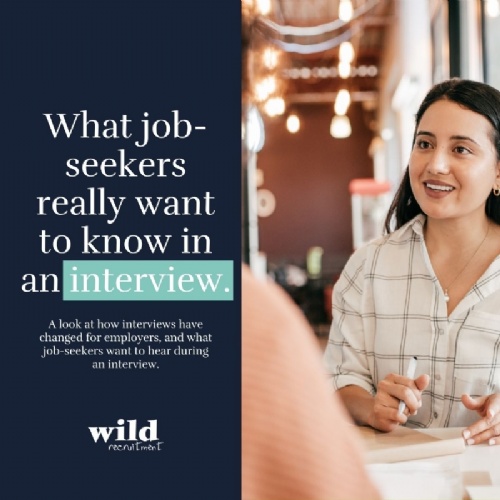What job-seekers want to know in an interview

Interviews have come a long way over the years, from simple one-sided Q&A sessions to two-way mutually beneficial discussions. Today’s talent isn’t just being assessed, they’re assessing you back.
With changing priorities for both sides, advances in technology to research applicants and companies before the interview, and growing ways of working, such as remote work, job-seekers care about more than just the job itself. They want to understand what their day-to-day looks like, how the job can help them to develop, and whether the company’s values align with their own.
In this blog, we look at the different areas candidates care about and how to prepare for your next interview.
Beyond the job description
Today’s candidates don’t settle for a list of duties, they want to picture the role in action. Share examples of what a typical day in the role may be like, examples of collaboration between different teams, and challenges applicants may experience in the role.
It’s important to be transparent and upfront about the duties of the role, both for the applicant and the company, so you can hire the most suited person.
Samples questions:
- What’s a typical day in the role?
- How does the team collaborate?
- What’s the pace, and how flexible are the hours?
Growth and learning opportunities
Offering learning and development opportunities is known to boost both recruitment and retention, with nearly a third of people (28%) saying they wouldn’t apply for a job with an employer that doesn’t invest in L&D training. It’s important to candidates that businesses want to invest in them just as much as they are investing themselves into the business.
Sample questions:
- Is there a clear path for development in the role?
- What are the opportunities for career progression?
- What types of training opportunities do you have in place?
Company culture
Company culture is a big go to for many companies currently, and a priority for many workers. With a significant amount of time spent at work and with colleagues, candidates will want to know the type of environment they are joining and how it will balance with their personal values. They may also be interested in the Equity, Diversity and Inclusion (EDI) policies in place so make sure to prepare for these questions or include them in the overview of the company.
Sample questions:
- Do colleagues tend to connect outside of work, or is it strictly professional?
- How is employee feedback reviewed?
- How is EDI prioritised?
Clarity on expectations
Workers value clarity and honesty at work, so your next hire needs to know what success looks like in the first 30, 60 and 90 days and how it is measured; as well as the ultimate goals for the role, whether temporary or permanent.
Laying out those benchmarks upfront turns performance conversations into productive check-ins, not surprises.
Sample questions:
- What are the top priorities for this role in the first three months?
- How often will I receive formal reviews of my performance and role?
Making interviews more candidate-centric means moving beyond scripted Q&As and adapting to be more transparent about the company and role. By opening up around real responsibilities, development pathways, cultural quirks and performance guardrails, you empower candidates to make informed choices and feel invested from the start.
With a new generation of talent focusing more on mutual benefits, company culture and authenticity, by adapting and treating every conversation as a chance to showcase how your team meets these priorities, you’ll attract talent that’s not just qualified, but genuinely excited to join you.

